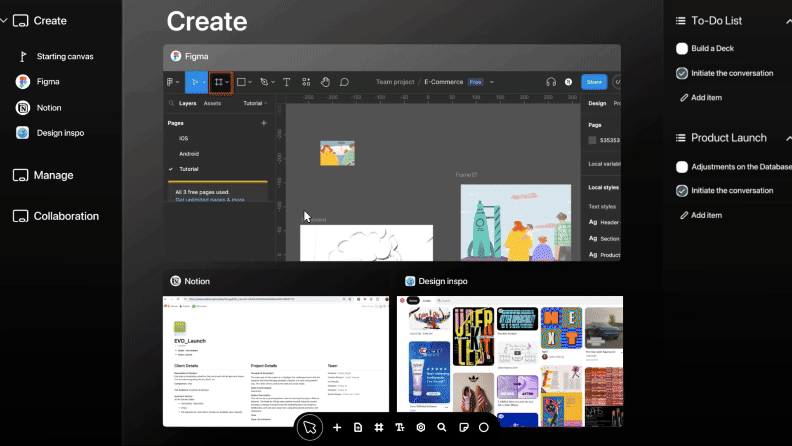Read Time: 5 minutes
Tech Topics In This Article: Atlanta startups, artificial intelligence, future of work
An ever-growing number of browser tabs. The constant toggling between Slack, email, calendars, cloud drives, and a sea of project documents.
The modern work environment is an endless cycle of app-switching, context-switching, and distraction. Tools meant to streamline our workflows often leave us buried in inefficiencies, with precious little time left for focused, meaningful work. But The Everyday Company, one of the latest startups to join Atlanta’s tech scene, wants to help you break away from this “chaos of digital work.”
For Jake Kaempf, founder of The Everyday Company, this isn’t just about creating another workplace tool — it’s about fundamentally replacing the use of the browser all together. By redesigning the way we interact with our digital workspaces, Kaempf is looking to empower the creative class in the age of AI.
Inside Everyday
Think of Everyday as an infinite digital canvas, designed to replace the browser as the primary platform for digital work by creating a more intuitive and project-focused platform.
The Everyday workspace consolidates tools, tabs, and workflows into a streamlined, customizable environment. This means no more bouncing between apps, switching between tabs, hunting down disparate pieces of information, and losing track of what you were working on.
Instead of juggling multiple apps and endless browser tabs, Everyday lets users create spaces tailored to their work needs. For example, a product manager might have a dedicated workspace with Slack conversations, Jira tickets, and Google Docs side by side, eliminating the need to switch back and forth between apps. Agencies might bring QuickBooks, Adobe Creative Cloud, email, and raw files together into one centralized workplace to help streamline collaboration with their teams.
What’s In It For Creatives?
Everyday’s value goes beyond just simplifying workflows. Its backend technology allows users to leverage a federated AI search, which acts as a “copilot” to surface relevant information across all the data stored in the platform. With AI at its core, Everyday helps users quickly find details from across all files, whether they’re in Slack conversations, Google Docs, or project management tools.
Soon, users will be able to build and deploy their own AI agents that can seamlessly operate across multiple applications, enhancing the user’s ability to manage and synthesize vast amounts of information with ease, fixing the inherent problem of data interoperability that plagues most AI platforms right now. This allows users to quickly access and deploy custom AI-driven applications, RAG (retrieval-augmented generation) apps, and small language models (SLMs) to automate and accelerate tasks.
For Kaempf, Everyday is most powerful when it is used by creatives who want to use AI to improve their work. Everyday’s goal is to enable users — especially those working in creative operations like marketers, designers, agencies, and startups — to move fast and stay ahead of the curve.
“I want to build technology that accelerates the creative class,” Kaempf added.
Building AI in Atlanta

Founder Jake Kaempf, who grew up in Oregon and later studied advertising at the Pratt Institute in New York, previously founded and bootstrapped the product and brand development firm Amprsnd. It was during his time building that company that he conceived the backend architecture for Everyday—a platform that was born from his own frustrations with the limitations of existing digital work environments.
While out on the West Coast, Kaempf had already been thinking about moving to Atlanta. The opportunity to move presented itself when he met Avoilan Bingham, the Atlanta-based investor at Drive Capital. Earlier this year, Kaempf packed up his family and moved to Midtown Atlanta to build Everyday in the Southeast hub.
Kaempf believes Atlanta has all the ingredients to nurture not only Everyday, but also a vibrant AI community. He highlights the city’s thriving entertainment sector, its deep tech talent pool, its unique cultural vibe, and strong business community as key opportunities for growth.
It was Kaempf’s vision about the future of work — for both individual contributors and for teams — that attracted Bingham and the Drive Capital team to back Everyday.

Early adopters have already noted Everyday’s benefits. Some provided feedback just using the exploding mind emoji, others saying they have started to “move their entire lives” over to Everyday.
Creative leaders at some of the most recognizable brands on the planet have also taken note of the platform’s usefulness.
Rich Robinson, Principal Product Manager at Amazon Live, said that Everyday “fixes the most real problem we have working and collaborating between different teams inside of our organization.”
Greg Hoffman, Former CMO at Nike, said that, “Today, brands need to deliver stories and experiences in real-time to keep up with the rising expectations and aspirations of their customers. “Everyday” empowers teams to not only keep that pace, but be out in front of the customer, delivering higher quality and more timely content that accelerates sales and builds brand strength in the market.”
—

